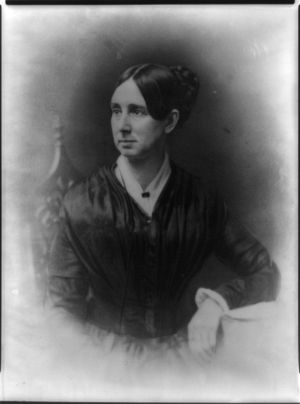Dorothea Dix
Dorothea Lynde Dix (April 4, 1802 – July 17, 1887) was an activist on behalf of the indigent insane who, through a vigorous program of lobbying state legislatures and the United States Congress, created the first generation of American mental asylums.
Life
Growing up in Worcester, born to a family in contsant distress, Dorthea Dix managed to become a woman whoose epitaph stated that the United States has not produced a more prductive or useful woman. Her father, , was an itinerant Methodist preacher who was also an alchoholic. Her mother was fourteen years her father's senior, and was constantly having headaches and struggled with depression and the families lack of finances. Dorthea took care of the other children. She never liked to talk about her childhood, and has said that she never had a childhood. She did learn to read and write from her father, howeveer, and taught her siblings also to read an write. She had found her vocation. She loved to teach.
When she was twelve, the fighting between her parents became too much, and she went to her paternal grandmother's house. She had always loved that grandfather, and loved reading his books from when he was at Harvard University. Her grandmother wanted her to become a lady, as she was rich she gave Dorthea, her namesake, tennis lessons, a seamstress to makeher clothes and everything a young society lady would want. She was very upset when Dorthea would be giving those clothes away to the poor who stood outside the gate. After a few years, Dorthea went to her aunt, as her grandmother felt her aunt could help her more. Dorthea wanted to return and help her siblings, and tried very hard, but it was four more years before she could return.
in her mid-thirties she suffered a debilitating breakdown. In hopes of a cure, in 1836 she traveled to England, where she had the good fortune to meet the Rathbone family, who invited her to spend a year as their guest at Greenbank, their ancestral mansion in Liverpool. The Rathbones were Quakers and prominent social reformers, and at Greenbank Dix met men and women who believed that government should play a direct, active role in social welfare. She was also exposed to the British lunacy reform movement, whose methods involved detailed investigations of madhouses and asylums, the results of which were published in reports to the House of Commons.
Work
After she returned to America, in 1840-41 Dix conducted a statewide investigation of how her home state of Massachusetts cared for the insane poor. She published the results in a fiery pamphlet, a Memorial, to the state legislature. "I proceed, Gentlemen, briefly to call your attention to the present state of Insane Persons confined within this Commonwealth, in cages, stalls, pens! Chained, naked, beaten with rods, and lashed into obedience." The outcome of her lobbying was a bill to expand the state's mental hospital.
Henceforth, Dix traveled from New Hampshire to Louisiana, documenting the condition of pauper lunatics, publishing memorials to state legislatures, and devoting enormous personal energy to working with committees to draft the appropriations bills needed to build asylums. She was instrumental in the founding of the first public mental hospital in Pennsylvania, the Harrisburg State Hospital, and later in establishing its library and reading room in 1853. [1]
Legacy
The culmination of her work was legislation to set aside 10,000,000 acres of Federal land, with proceeds from its sale distributed to the states to build and maintain asylums. Dix's land bill passed both houses of congress, but in 1854 President Franklin Pierce vetoed it, arguing that the federal government should not involve itself in social welfare.
Stung by the defeat of her land bill, in 1854-55 Dix traveled to England and Europe, where she reconnected with the Rathbones and conducted investigations of Scotland's madhouses that precipitated the Scottish Lunacy Commission.
During the Civil War, Dix was appointed Superintendent of Army Nurses. Unfortunately the qualities that made her a successful crusader—independence, single-minded zeal—did not lend themselves to managing a large organization of nurses. She was gradually relieved of real responsibility and would consider this chapter in her career a failure.
She spent her last years living as a guest in the New Jersey State Hospital in Trenton that was founded because of her lobbying.
Notes
- ↑ Historic Asylums article on Harrisburg State Hospital. The Dorothea Dix Museum and Library founded in 1853 is located at the Harrisburg State Hospital.
Recommended Reading
- Gollaher, David: Voice for the Mad: The Life of Dorothea Dix, (The Free Press, 1995)
ReferencesISBN links support NWE through referral fees
- Bumb, Jenn. "Dorothea Dix." Women's Intellectual Contributions to the Study of Mind and Society.
Credits
New World Encyclopedia writers and editors rewrote and completed the Wikipedia article in accordance with New World Encyclopedia standards. This article abides by terms of the Creative Commons CC-by-sa 3.0 License (CC-by-sa), which may be used and disseminated with proper attribution. Credit is due under the terms of this license that can reference both the New World Encyclopedia contributors and the selfless volunteer contributors of the Wikimedia Foundation. To cite this article click here for a list of acceptable citing formats.The history of earlier contributions by wikipedians is accessible to researchers here:
The history of this article since it was imported to New World Encyclopedia:
Note: Some restrictions may apply to use of individual images which are separately licensed.
